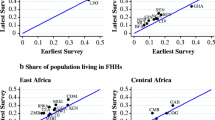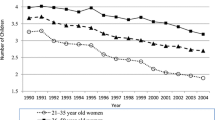Abstract
This paper examines the relationships between female headship status of households and family welfare in rural Ecuador. We first review theoretical arguments for why female headship may affect family welfare. Descriptive analysis indicates that female-headed households are worse off according to a variety of measures of welfare. We then focus on children's school enrollment as a specific measure of welfare and estimate a multivariate model to assess the effects of female headship on the probability of enrollment. We find that children in female-headed households are disadvantaged in this respect and that the effect of female headship varies across marital status categories of the female head.
Similar content being viewed by others
References
Bilsborrow RE, Peek P (1992) Peasant farming and labour migration: evidence from the ecuadorian highlands. Proceedings of IUSSP Conference on the Peopling of the Americas, May 18–28, 1992, Veracruz, Mexico, Volume 2, pp 357–375
Bilsborrow RE, McDevitt TM,Kossoudji S, Fuller R (1987) The impact of origin community characteristics on rural-urban out-migration in a developing country. Demography 24(2):191–210
Bilsborrow RE, Oberai AS, Standing G (1984) Migration surveys in low-income countries: guidelines for survey and questionnaire design. Croom Helm, London
Bruce J (1989) Homes divided. World Dev 17(7):979–992
Bruce J, Dwyer D (1988) A home divided: women and income in the third world. Stanford University Press, Stanford
Bruce J, Lloyd C (1992) Beyond female headship: family research and policy issues for the 1990s. Paper prepared for IFPRI workshop on Intrahousehold Resource Allocation: Policy Issues and Research Methods, February 12–14, 1992, Washington, DC
Buvinic M, Lycette MA, McGreevey WP (1983) Women and poverty in the third world. Johns Hopkins University Press, Baltimore
CEPAR (1988) Analisis multivariado de los determinantes de la fecundidad en communidades rurales del Ecuador. Centro de Estudios de Poblacion y Paternidad Responsable, Quito, Ecuador
Chernichovsky D (1985) Socioeconomic and demographic aspects of school enrollment and attendance in rural Botswana. Econ Dev Cult Change 33(2):319–332
DeGraff DS, Bilsborrow RE, Herrin AN (1992) The implications of high fertility for children's time use in the Philippines. Paper prepared for the annual meeting of the Population Association of America, April 30–May 2, 1992, Denver
DeVos S (1992) A preliminary demographic view of change 1970–1980 in unmarried mothers 15–49 heading their own households in Brazil. Paper prepared for the annual meeting of the Population Association of America, April 30–May 2, 1992, Denver
ENDEMAIN (1989) Encuesta demografica y de salud materna e infantil: informa resumido sobre nupcialidad y fecundidad. Centro de Estudios sobre Poblacion y Paternidad Responsable, Quito, Ecuador
International Center for Research on Women (1988) Women-headed households: issues for discussion. Paper prepared for the ICRW and Population Council Seminar Series on the Determinants and Consequences of Female-Headed Households
King E, Evenson RE (1983) Time allocation and home production in philippine rural households. In: Buvinic M, Lycette MA, McGreevey WP (eds) Women and poverty in the third world. Johns Hopkins University Press, Baltimore, pp 35–61
Kossoudji S, Mueller E (1983) The economic and demographic status of female-headed households in rural Botswana. Econ Dev Cult Change 31:831–859
Levison D (1991) Children's labor force activity and schooling in Brazil. Unpublished Ph.D. dissertation, University of Michigan, Ann Arbor
Lloyd C, Brandon A (1991) Women's role in maintaining households: poverty and gender inequality in Ghana. Population Council Working Paper 25
Mueller E (1984) The value and allocation of time in rural Botswana. J Dev Econ 15:329–360
Oppong C (1983) Women's roles, opportunity costs, and fertility. In: Bulatao RA, Lee RD (eds) Determinants of fertility in developing countries. Academic Press, New York, Vol 1
Rosenhouse S (1988) Identifying the poor: is headship a useful concept? Paper prepared for ICRW and Population Council Seminar Series on the Determinants and Consequences of Female-Headed Households
Thomas D (1990) Intra-household resource allocation: an inferential approach. J Human Resources 25(4):635–664
Author information
Authors and Affiliations
Rights and permissions
About this article
Cite this article
DeGraff, D.S., Bilsborrow, R.E. Female-headed households and family welfare in rural Ecuador. J Popul Econ 6, 317–336 (1993). https://doi.org/10.1007/BF00599041
Received:
Accepted:
Issue Date:
DOI: https://doi.org/10.1007/BF00599041




